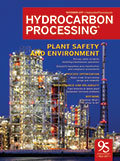
November 2017
Special Focus: Plant Safety and Environment
As safety becomes increasingly paramount at hydrocarbon processing facilities, so too does the importance of addressing and clarifying the confusion associated with hazardous area classification (HAC) assessments and compliance auditing in Class 1 locations.
Joint stripping in a refinery sour water stripper (SWS) unit contributes to the concentration of phenols and total nitrogen (N) in the discharged treated water from the wastewater treatment unit.
Some process safety incidents occur as the result of simultaneous or sequential occurrences of operations or activities that interfere or clash with each other.
After a process engineer has completed preliminary documents such as process flow diagrams, material and energy balance, piping and instrumentation diagrams, equipment data sheets, process control philosophies, identifications of the hazardous nature of raw materials, chemicals, byproducts and final products, process equipment layout drawings (plans and elevations), unit plot plans, etc., these documents are issued to other disciplines to carry out further engineering.
Process Optimization
Revamping refineries to process heavier crude slates goes well beyond the requirements to meet equipment performance dictated by a shift in the quantity of lighter product yields to heavier products.
The manufacturing of styrene commonly uses 2,4-dinitro-6-sec butylphenol (DNBP) as a retarder to protect against styrene polymer formation.
In the operation of natural gas pipelines, a blockage or leak can cause expensive production losses, damage equipment and pose safety hazards.
In the oil and gas sector, fractionation is a vital part of every plant.
Maintenance and Reliability
Lost production from corrosion costs the oil and gas industry more than $1 B/yr.1
The Petronor oil refinery is located in northeastern Spain. Recently, the facility converted its last rolling element-equipped machine from liquid oil lubrication to pure (“dry-sump”) oil mist.
Reciprocating compressors use a piston rod connected to a drive train at the crosshead section.
Compressor failure in an oil refinery can have severe consequences on health, safety and the environment.
Columns
One of the main focal points in this issue of Hydrocarbon Processing is the environment.
In a recent conversation with a “pump veteran,” we explored his 33 yr of experience with pump original equipment manufacturers (OEMs) from 1984–1997 and with a widely known non-OEM (1997–2017).
Within the refining industry, gasoline production and alkylation capacity are running at near all-time highs.
As the oil and gas industry adjusts to a business environment in which crude oil prices will likely remain lower for longer, refiners continue looking for ways to maximize their profitability.
Russia hopes to become a major supplier of gasoline, diesel fuel and other oil products to the Asia-Pacific region during the next several years, with help from the planned launch of large-scale refineries in the Far East that will be built with the participation of Asian investors.
In Part 1 of this column (Hydrocarbon Processing, September), I began discussing useful techniques that fall into the general category referred to as “soft skills.”
Proper filtration is one of the most important functions performed inside refineries.
In 2017, Petrotechnics released its process safety and risk management (PSM) survey.
Trends and Resources
Nearly 700 refineries are operating in more than 120 countries around the world.
The global oil refining industry has been buffeted by many events in recent years.
The global middle distillate market continued to improve on healthy demand and depleted stocks amid regional maintenance, while the bottom of the barrel saw pressure due to low demand and high inventory levels in Asia and Europe.
ABB has introduced a new MID/OIML R117 certified high-accuracy CoriolisMaster Coriolis mass flowmeter for custody transfer applications in the oil and gas industry (FIG. 1).

- SkyNRG starts construction on its first SAF plant in Delfzijl, the Netherlands 2/13
- India's Reliance wins U.S. license for Venezuelan oil 2/13
- Singapore light distillates stocks hit over 3-yr high on robust imports 2/13
- Three contractors injured at ExxonMobil facility in Beaumont, Texas (U.S.) 2/13
- China's epic renewables boom lifts it into rare clean capacity club 2/13
- TotalEnergies booked loss in France due to refining activities, CEO says 2/13




